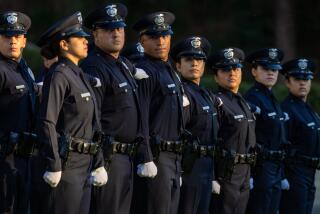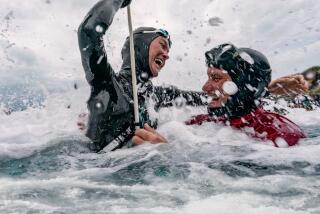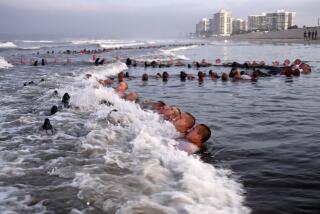Fears Persist of Terrorism Links at Scuba School
- Share via
AMSTERDAM — The guys around the scuba school laughingly called them the “Al Qaeda Diving Team.”
But for law enforcement officials, it was no joke.
Late last year, Dutch counter-terrorism agents investigating a possible Al Qaeda recruitment cell grew interested in the school because a man suspected of recruiting terrorists had become a certified diver and studied to be an instructor there. Iraqi-born Kasim Ali was one of between 50 and 150 Muslim men who had taken classes in recent years with the same Tunisian instructor at the school in the city of Eindhoven, about 70 miles southeast of Amsterdam.
The student roster in Eindhoven heightened fears among investigators. In the past, captured Al Qaeda operatives have talked about plans to use scuba divers in attacks. As a result, the FBI did a canvass of dive shops and schools in the United States last year. Investigators worry that Al Qaeda-trained divers could plant explosives on the hulls of ships, act as seagoing suicide bombers or sneak aboard vessels and commandeer them for attacks.
“We’ve always been concerned about a maritime threat, and this adds credence to it,” said a U.S. official familiar with the Eindhoven case. “We are in the process of tracking everything down.”
Dutch and U.S. investigators learned that several of the students in the Eindhoven classes were suspected Islamic extremists.
An Algerian who was certified at the school and later deported by the Dutch was arrested in France in November along with an accused terrorist who had escaped from a Dutch jail, according to a U.S. official. Authorities in a non-European country are holding a third man, believed to be a Libyan who studied diving in Eindhoven, because of his ties to extremist violence, the official said.
There were also leads linking diving students with Al Qaeda network operatives who were convicted in Morocco of plotting maritime attacks on U.S. ships in the Strait of Gibraltar, the U.S. official said.
Months later, suspicions persist but there are few answers. Dutch prosecutors have not found evidence enabling them to allege that the diving classes were conducted with the intent to commit acts of terrorism, according to Wim de Bruin, a spokesman for the federal prosecution service.
Moreover, prosecutors were unable to convict Ali, the Iraqi-born diver, and 11 associates of charges that they formed a cell that recruited young Dutch Muslims for Al Qaeda’s terrorist activities. Last month, all 12 were acquitted of charges of belonging to a criminal organization, assisting the enemy at a time of war and trafficking in drugs to finance their activities. Two defendants were convicted of possessing fraudulent documents. The prosecution has appealed the acquittals under Dutch law that permits a higher court to order a new trial.
The verdict and the mysterious diving classes exemplify the tension between gathering intelligence and building successful court cases. The verdict also illustrates the obstacles to fighting terrorism in the Netherlands, according to counter-terrorism officials.
Two years after the Sept. 11 attacks, the Netherlands still lacks strong anti-terrorism laws. Al Qaeda’s fluid and elusive networks are active in the Netherlands and neighboring Belgium, exploiting traditions of political tolerance and old-fashioned court systems, according to European and U.S. counter-terrorism officials.
The prosecutors in the case involving the Iraqi-born diver, for example, tried to overcome limited legal tools by charging the defendants with aiding the enemy in wartime. A court, however, firmly rejected the argument that Dutch involvement in Afghan peacekeeping operations put the Netherlands in a state of war with Al Qaeda and the Taliban.
It was the second defeat of a major prosecution of accused Islamic terrorists here: In December, a court cleared four men charged in an alleged Al Qaeda plot to bomb the U.S. Embassy in Paris. In both cases, judges were reluctant to accept copious evidence gathered by the Dutch intelligence service, known as the AIVD, which balked at revealing its sources.
In response, the Justice Ministry has proposed legislation making it a crime to conspire to commit a terrorist offense and to recruit for the Islamic armed struggle. The government is also considering reforms making it easier for intelligence agents to present evidence in court.
Investigators remain keenly interested in the diving students, according to the U.S. official. But were the classes a concerted effort to train aspiring terrorists as divers, or was it all an innocent coincidence that investigators blew out of proportion?
Intriguingly, two of the world’s busiest ports are in Rotterdam, Netherlands, and Antwerp, Belgium, each a short drive from Eindhoven.
“Underwater demolition is not easy,” the U.S. official said. “But it could be a lot of things. It’s not just blowing up a boat, or blowing up yourself. There are different scenarios.”
To safeguard against any potential threat, Dutch law enforcement has shared information about the divers with investigators from other countries.
“We took it seriously,” said De Bruin, the spokesman for the federal prosecution service. “Since Sept. 11, 2001, we are cooperating with agencies all over the world to prevent attacks by Al Qaeda. You may presume that in this matter we are also cooperating with agencies around the world.”
Because of Al Qaeda’s flair for imaginative and unorthodox violence, scenarios such as an assault by scuba divers on a U.S. or European port no longer seem farfetched to authorities. Or to people like Bill Megens, the owner of the Safe Dive School in Eindhoven where the suspects studied.
“There is a very interesting parallel you could draw to the flight lessons taken by the 9/11 group,” said Megens, who has cooperated energetically with law enforcement. “I’m very afraid I’ve made a mistake in judging people. But as a diving school, we can’t turn people away because they are Islamic.”
The investigation has centered on classes taught by the Tunisian instructor, Wahid Gomri, who got his certification at the Safe Dive School. Dutch investigators have interviewed the school’s staff at length about Gomri and his students, making several return visits this year, according to Megens. But Gomri has not been charged.
Citing Dutch law, De Bruin said he could not discuss Gomri’s status in the investigation, and Gomri did not respond to a request for an interview. He recently gave a brief interview to Dutch television in which he insisted that he has no ties to terrorism.
Gomri was born in 1968, according to officials. Megens said the Tunisian first came to study at the Safe Dive School about 10 years ago after he arrived in the Netherlands and applied for political asylum, a common route to legal status here.
About seven years ago, Gomri decided to become an instructor and won certification at the Eindhoven school, which is affiliated with the U.S.-based Professional Assn. of Diving Instructors, Megens said. Because of the chilly climate and the expense involved, his persistence in taking outdoor classes was impressive, according to Megens.
“He got his certification in nine months,” Megens said. “That’s incredibly fast for Dutch standards.”
During that period, Dutch intelligence agents came to the school to ask questions about Gomri but he ultimately became a legal immigrant, Megens said. Soon the Tunisian began renting equipment at the school to teach his own summer classes for Arabic speakers at lakes around the Netherlands, Megens said.
Gomri was friendly and likable, Megens said.
Unanswered Questions
“I know him very well,” Megens said. “I trust him 98% that he is an honest citizen of Europe. But ... I have a few big questions for which I don’t have answers.”
One question is money. Although he was a recently arrived refugee, Gomri paid about $8,000 for his accelerated certification course, Megens said. He later rented expensive scuba diving suits, tanks and other gear on a regular basis, Megens said. The Tunisian instructor always paid on time, though he haggled for lower prices, Megens said.
About a year and a half ago, Gomri purchased a bulk order of about $7,000 worth of suits and equipment with funds that came to the school via a bank transfer from India, Megens said. That long-distance transaction attracted the attention of investigators, he said.
The pupils who came with Gomri to the school to pick up gear spoke little Dutch or English. They often said they were visiting from countries such as Lebanon, Saudi Arabia and Afghanistan, according to Megens. Others were from North Africa or were locals from Eindhoven, according to Megens and officials. Many students arrived during the summer, studied with Gomri and then returned to North Africa or the Middle East, according to officials.
Despite the Netherlands’ tranquil image, Eindhoven has been a hotbed of Islamic extremism.
Mounir Motassadeq, a Moroccan recently convicted in Germany of helping a terrorist cell in Hamburg plan the Sept. 11 attacks, attended an Islamic seminar in 1999 at Eindhoven’s Al Fourkhan mosque along with other associates of the Hamburg plotters. The mosque shares a complex with a Saudi-connected Muslim cultural organization known as Al Waqf al Islami that promotes fundamentalism, according to authorities.
Some of the diving students and the men who went on trial on charges of terrorist recruitment attended the mosque, officials said.
Rising Suspicion
Gomri’s classes began in the late 1990s and were busiest during 2001, Megens said. After the Sept. 11 attacks cast suspicion on Muslim men worldwide, the staff at the dive school grew more curious. They noted that the Sept. 11 hijackers and other terrorists had gathered information on activities that suddenly seemed ominous: things like crop dusting and obtaining licenses to haul toxic waste.
Somewhat uneasily, Megens bantered with Gomri and his students about terrorism.
“After 9/11, we called them the Al Qaeda Diving Team,” Megens recalled. “We had fun about it with them. We all laughed. But we also wondered.”
About two years ago, Gomri told Megens that he had traveled to Saudi Arabia and hoped to start a dive school there with a Saudi friend, Megens said. The Tunisian finally left Eindhoven about a year and a half ago, saying he had plans to teach diving in Britain, according to Megens.
In January, Dutch agents came to Megens and asked for help investigating the diving classes. The police showed him photos of Arab-looking men in scuba diving suits.
The initial list of Gomri’s pupils compiled by instructors for police contained 150 names, De Bruin said. But Megens estimates that the number of students was closer to 50 or 60. The actual number appears to be somewhere between the two extremes, the U.S. official said.
Gomri has remained in telephone and e-mail contact from Britain with people at the diving school, Megens said. He returns periodically to the Netherlands, according to the U.S. official.
Gomri is exasperated by the suspicions, according to Megens. Gomri argues that, if he were a terrorist, he would not have chosen a U.S.-affiliated school where about half the instructors work in Dutch law enforcement, Megens said.
Megens’ fascination with the mystery led him to organize an experiment. With the approval of port police in Rotterdam, he and fellow instructors simulated a clandestine underwater approach to a moored cargo ship.
The dark waters and deafening engine noise made it difficult for experienced divers to maneuver. A comparative amateur strapped with heavy explosives -- and probably battling stress and fear -- would have even more trouble, Megens said.
But recent history shows that malicious intentions can overcome technical limitations, he said.
“If you are driven by fanaticism, maybe that makes you stronger than you think,” Megens said.
More to Read
Sign up for Essential California
The most important California stories and recommendations in your inbox every morning.
You may occasionally receive promotional content from the Los Angeles Times.













